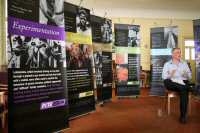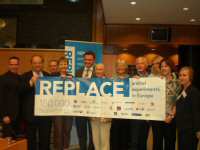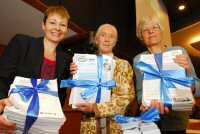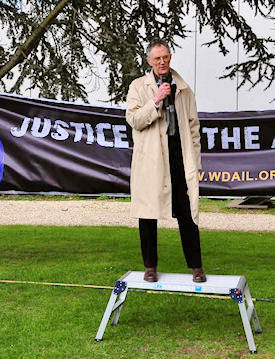Previous Events
View Michaelmas Term 2012
View Hilary Term 2011
View Michaelmas Term 2010
View Hilary Term 2010
View Michaelmas Term 2009
View Trinity Term 2009
View Hilary Term 2009
View Michaelmas Term 2008
Trinity Term 2008
PETA EXHIBITION
In 3rd week, VERO hosted the "Animal Liberation Project", a powerful exhibition by PETA (People for the Ethical Treatment of Animals) which compels us to question our treatment of animals and consider the parallels between human and animal oppression. Launched last year to coincide with the bicentenary of the abolition of slavery, it takes its name from the book by Peter Singer which is widely acknowledged to have inspired the modern animal rights movement.
It was with a quote from that philosopher that Alistair Currie, Senior Research and Campaigns Co-ordinator for PETA Europe, began his presentation of the exhibition. "It's easy for us to criticise the prejudices of our grandfathers. It's more difficult to distance ourselves from our own views, so that we can dispassionately search for prejudices amongst the beliefs and values we hold".
 This aptly sums up the purpose of the exhibition. In Alistair's words,
"it's about what we can learn from history and how we can open our eyes to
what goes on around us". The striking parallel images before us - chained
African slaves versus tethered "dancing" bears, forced labourers versus
battery-farmed hens, restrained torture victims versus helpless laboratory
animals - begged a simple question. "If massacre, torture, enslavement and
the like are wrong for human beings, aren't they wrong for animals too?
Surely, after all, it's what we do that's right or wrong, and not who it's
done to that makes it right or wrong".
This aptly sums up the purpose of the exhibition. In Alistair's words,
"it's about what we can learn from history and how we can open our eyes to
what goes on around us". The striking parallel images before us - chained
African slaves versus tethered "dancing" bears, forced labourers versus
battery-farmed hens, restrained torture victims versus helpless laboratory
animals - begged a simple question. "If massacre, torture, enslavement and
the like are wrong for human beings, aren't they wrong for animals too?
Surely, after all, it's what we do that's right or wrong, and not who it's
done to that makes it right or wrong".
According to Alistair, the slavery theme has a particular resonance for us today because it shows that you don't have to be evil to do evil. Many slave traders and slave owners weren't the ruthless monsters we might imagine them to have been: in fact they often professed a sense of respect and affection towards their slaves, and would find ways of rationalising their own behaviour and convincing themselves that the relationship was mutually beneficial.
On the much debated concept of "animal rights", Alistair had this to say: "Our weaknesses give us rights, not our strengths, and if animals share those weaknesses, they should share those rights, in so far as they make sense. No one is saying that animals should have the right to vote or should be tried in court - we're just saying that they shouldn't be killed, imprisoned or abused just because the strong think they'll benefit from it."
Summing up why animal liberation is so important given the amount of human suffering in the world, Alistair quoted John Newton, the slave trader turned abolitionist who wrote the words to Amazing Grace: "The real or supposed necessity of treating the Negroes with rigour gradually brings a numbness upon the heart and renders those who are engaged in it too indifferent to the sufferings of their fellow-creatures." It could therefore be argued, Alistair suggested, that we humans are "one of the animals that stands to gain the most from animal liberation".
For more information and to view the Animal Liberation exhibition online, see: www.peta.org.uk/animalliberation/introduction.asp
ACER seminar on animal replacement
At VERO's meeting with the University's Committee on Animal Care and Ethical Review (ACER) in May 2007, we had expressed concern that the optional seminars organised periodically by the Committee for members of the University engaged in animal research rarely seemed to address the issue of replacement, the most important of the 3 "R"s in VERO's view. After a period of correspondence between the two parties, ACER undertook to organise a seminar in May of this year focusing on recent developments in imaging techniques and their potential for replacing animals. The speakers, proposed by ACER and VERO respectively, were Dr Matthew Rushworth, University Research Lecturer and Reader in Cognitive Neuroscience, Department of Experimental Psychology, and Dr Gill Langley, Science Director of the Hadwen Trust for Humane Research and former member of the government's advisory Animal Procedures Committee.
The seminar was well attended, and gave rise to some lively discussion. Dr Rushworth - a former recipient of a Dr Hadwen Trust grant - spoke first, arguing that the usefulness of current imaging techniques was limited by their insufficient spatial and temporal resolution. Dr Langley in turn pointed out the limitations of animal methods (physiological differences, poor predictivity) and stressed the advantages of recently developed imaging methods (repeatability, feedback from the test subject). Her main focus was on the ethics of the matter, however, to which some members of the audience took exception, clearly feeling that this was extraneous to the scientific discussion. It is of course VERO's view that - in accordance with the spirit of the 1986 Animals (Scientific Procedures) Act - any discussion of the pros and cons of a scientific technique must necessarily take into account its ethical acceptability to ordinary people. This occasion showed how important it is that the scientific community should be continually reminded of this imperative.
In all, therefore, the seminar proved a useful and informative event for all concerned, VERO included, and we very much hope to see this kind of constructive dialogue continue within the University.
Petition hand-in event in Brussels
VERO members were delighted to attend the hand-in of the Dr Hadwen Trust petition on animal replacement at the European Parliament in May of this year. Over 150,000 signatures had been collected with the aid of animal protection groups across thirteen member states, clearly demonstrating that EU citizens are united in their support for non-animal research. The petition, which calls for a coordinated EU strategy to replace animal experiments, was presented by renowned primatologist and UN Messenger of Peace Dr Jane Goodall DBE.
 This call comes as the European Commission prepares to publish draft
legislation to update the EU law on animal experimentation (Directive 86/609
EEC), which is now more than twenty years old. The Dr Hadwen Trust wants to
use the revision as an opportunity to focus Europe on the ultimate goal of
replacing animal use with more advanced and reliable alternative methods.
This call comes as the European Commission prepares to publish draft
legislation to update the EU law on animal experimentation (Directive 86/609
EEC), which is now more than twenty years old. The Dr Hadwen Trust wants to
use the revision as an opportunity to focus Europe on the ultimate goal of
replacing animal use with more advanced and reliable alternative methods.
Together with the Humane Society International, the Dr Hadwen Trust hosted an expert briefing at the European Parliament in Brussels, supported by MEPs Jens Holm, Chris Davies, John Bowis, Caroline Lucas and Dan Jorgensen. The event highlighted the welfare, scientific, human health and economic benefits of replacing animal experiments.
After an introduction by Caroline Lucas, the case for replacement was outlined by Dr Jane Goodall and Dr Gill Langley, Science Director of the Dr Hadwen Trust. The second part of the briefing looked at current replacement initiatives. The contributors were Prof. Geoff Pilkington, Professor of Cellular & Molecular Neuro-oncology at Portsmouth University, on his work with brain tumours; Prof. Horst Spielmann, head of ZEBET, the German Centre for Documentation and Evaluation of Alternatives to Animal Experiments, on the innovative new search engine "Go3R"; and Prof. Irene Tracey, Director of Oxford's fMRIB Centre, on the use of imaging techniques in pain research. The third part of the briefing examined how improved animal protection could be embodied in the revised Directive. The speakers were Dr Herman Koeter from the EFSA (European Food Safety Authority), which was asked to contribute its scientific opinion to the revision process, and Emily McIvor, EU Director of the Humane Society International, who gave an account of the current political situation. The will to reform is clearly there among MEPs (witness the recent Written Declaration against primate research), but progress continues to be frustrated by the Commission, which has yet to put forward a proposal.
 The hand-in event also coincided with the launch of a new report
co-written by the Dr Hadwen Trust and Humane Society International and
entitled "Towards a European science without animal experiments". The key
elements of the EU strategy proposed by the report are as follows:
The hand-in event also coincided with the launch of a new report
co-written by the Dr Hadwen Trust and Humane Society International and
entitled "Towards a European science without animal experiments". The key
elements of the EU strategy proposed by the report are as follows:
1) Protection of laboratory animals should be extended to all sentient
species and use of those species which suffer most in laboratory conditions
should be banned, as should experiments causing severe suffering
2) There should be greater transparency in terms of ethical reviews,
laboratory inspections, statistics, etc.
3) A new EU centre of excellence for the 3Rs should be established,
incorporating an expanded ECVAM (which at present only serves to validate
regulatory tests), plus national centres in all member states based on our
NC3Rs and the German ZEBET centre. This would allow more funding for
research, provide training in alternative techniques, set up shared
databases to prevent duplication, ensure regular reporting and set
EU/national year-on-year targets.
"We should admit that the infliction of suffering on beings who are
capable of feeling is ethically problematic, and that the amazing human
brain should set to work to find new ways of testing and experimenting that
will not involve the use of live, sentient beings. The scientific
establishment should actively encourage such research. More funding should
be made available for it. And rewards - such as a Nobel Prize - should be
given for it. It is a goal worthy of great energy and scientific ingenuity.
It is a goal towards which all civilized nations should be moving."
Dr Jane Goodall DBE
View Hilary Term 2008
View Michaelmas Term 2007
View Hilary Term 2007
View Public meeting held on November 28th 2006
